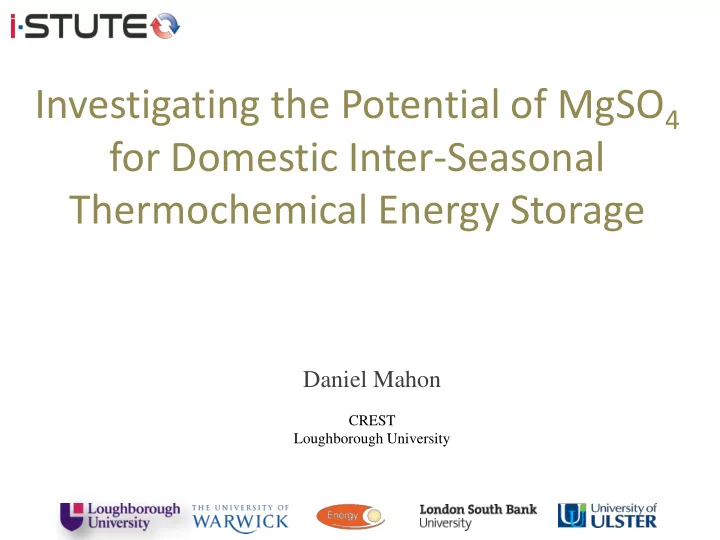

Investigating the Potential of MgSO 4 for Domestic Inter-Seasonal Thermochemical Energy Storage Daniel Mahon CREST Loughborough University
Introduction Small Scale (~10mg) Dehydration characterisation – Assessment of the theoretical energy density • Dehydration within DSC & TGA(+RGA). • SEM(+EDX) & N 2 Vapour Sorption also used. • Materials hydrated with 1.3kPa pH 2 O (achievable winter conditions) • 1, 5 & 10 ˚C/min heating rates used • Several cycles conducted.
Lower Desorption Temperature Tests • Tested MgSO 4 .7H 2 O. Dehydrated to 110 and 150 ˚C (using three heating rates). • Minimum difference in dehydration enthalpy (~100J/g). • Possibility of using a lower desorption temperature.
Lower Desorption Temperature Tests • Tested MgSO 4 .7H 2 O. Dehydrated to 110 and 150 ˚C (using three heating rates). • Minimum difference in dehydration enthalpy (~100J/g). • Possibility of using a lower desorption temperature. Sample No. Heating Rate Dehydration Enthalpy Average (˚C/min) Temperature (˚C) Enthalpy (J/g) (Normalised) (J/g) 1 1 110 1230.6 2 5 110 1330.1 1284 3 10 110 1291.5 4 1 150 1429.4 5 5 150 1382.1 1386 6 10 150 1347.3
TGA Cycle Stability of MgSO 4 (10 ˚C/min) • Material rehydrates to hexahydrate • No sign of degradation
DSC Cycle Stability of MgSO 4 (10 ˚C/min) • Shift in peak dehydration to lower temperature range. • Less volatile with increasing cycles. • Average enthalpy, over 7 cycles =1200J/g .
Cycle Stability of Zeolite • No sign of degradation • Majority (~750J/g) of enthalpy below 150 ˚C • Unaffected by heating rates
Cycle Stability of Composites • Composite materials = Zeolite + (wt%)MgSO 4 • Pure MgSO 4 has poor hydration kinetics • Promising dehydration enthalpy
Heating rate effects of Composites • All composites have similar peak dehydration temp. • DSC plots of composites show no volatile behaviour. • Zeolite impregnation appears to neutralize the heating rate affects of the MgSO 4 • Promising for practical applications of the composites
Nitrogen Vapour Sorption Testing • To assess the changing surface area and porosity of each sample nitrogen vapour sorption testing was conducted. • Higher surface area and pore volume (Micro or Mesopores) is beneficial. • Each sample degassed at 170˚C for 3h using N 2 as a purge gas.
Nitrogen Vapour Sorption Testing • BET surface area decreases with increasing wt% • Majority of Zeolites pore volume is from 5nm pores (i.e. Mesopores)
Summary • MgSO 4 – Minimal degradation, characteristics appear to improve with successive cycles. • Zeolite – Unaffected by heating rates, zero visible degradation & high surface area • Composite Materials – Promising enthalpy, decreased heating rate effects.
Thank You Questions?
Recommend
More recommend